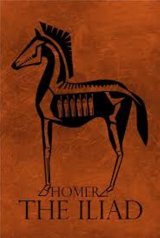Iliad Page #3
The Iliad is an ancient Greek epic poem in dactylic hexameter, traditionally attributed to Homer. Set during the Trojan War, the ten-year siege of the city of Troy (Ilium) by a coalition of Greek states, it tells of the battles and events during the weeks of a quarrel between King Agamemnon and the warrior Achilles.
(For both the princes claim'd her equal care); Behind she stood, and by the golden hair Achilles seized; to him alone confess'd; A sable cloud conceal'd her from the rest. He sees, and sudden to the goddess cries, Known by the flames that sparkle from her eyes: [Illustration: MINERVA REPRESSING THE FURY OF ACHILLES.] MINERVA REPRESSING THE FURY OF ACHILLES. "Descends Minerva, in her guardian care, A heavenly witness of the wrongs I bear From Atreus' son?--Then let those eyes that view The daring crime, behold the vengeance too." "Forbear (the progeny of Jove replies) To calm thy fury I forsake the skies: Let great Achilles, to the gods resign'd, To reason yield the empire o'er his mind. By awful Juno this command is given; The king and you are both the care of heaven. The force of keen reproaches let him feel; But sheathe, obedient, thy revenging steel. For I pronounce (and trust a heavenly power) Thy injured honour has its fated hour, When the proud monarch shall thy arms implores And bribe thy friendship with a boundless store. Then let revenge no longer bear the sway; Command thy passions, and the gods obey." To her Pelides:--"With regardful ear, 'Tis just, O goddess! I thy dictates hear. Hard as it is, my vengeance I suppress: Those who revere the gods the gods will bless." He said, observant of the blue-eyed maid; Then in the sheath return'd the shining blade. The goddess swift to high Olympus flies, And joins the sacred senate of the skies. Nor yet the rage his boiling breast forsook, Which thus redoubling on Atrides broke: "O monster! mix'd of insolence and fear, Thou dog in forehead, but in heart a deer! When wert thou known in ambush'd fights to dare, Or nobly face the horrid front of war? 'Tis ours, the chance of fighting fields to try; Thine to look on, and bid the valiant die: So much 'tis safer through the camp to go, And rob a subject, than despoil a foe. Scourge of thy people, violent and base! Sent in Jove's anger on a slavish race; Who, lost to sense of generous freedom past, Are tamed to wrongs;--or this had been thy last. Now by this sacred sceptre hear me swear, Which never more shall leaves or blossoms bear, Which sever'd from the trunk (as I from thee) On the bare mountains left its parent tree; This sceptre, form'd by temper'd steel to prove An ensign of the delegates of Jove, From whom the power of laws and justice springs (Tremendous oath! inviolate to kings); By this I swear:--when bleeding Greece again Shall call Achilles, she shall call in vain. When, flush'd with slaughter, Hector comes to spread The purpled shore with mountains of the dead, Then shall thou mourn the affront thy madness gave, Forced to deplore when impotent to save: Then rage in bitterness of soul to know This act has made the bravest Greek thy foe." He spoke; and furious hurl'd against the ground His sceptre starr'd with golden studs around: Then sternly silent sat. With like disdain The raging king return'd his frowns again. To calm their passion with the words of age, Slow from his seat arose the Pylian sage, Experienced Nestor, in persuasion skill'd; Words, sweet as honey, from his lips distill'd:(58) Two generations now had pass'd away, Wise by his rules, and happy by his sway; Two ages o'er his native realm he reign'd, And now the example of the third remain'd. All view'd with awe the venerable man; Who thus with mild benevolence began:-- "What shame, what woe is this to Greece! what joy To Troy's proud monarch, and the friends of Troy! That adverse gods commit to stern debate The best, the bravest, of the Grecian state. Young as ye are, this youthful heat restrain, Nor think your Nestor's years and wisdom vain. A godlike race of heroes once I knew, Such as no more these aged eyes shall view! Lives there a chief to match Pirithous' fame, Dryas the bold, or Ceneus' deathless name; Theseus, endued with more than mortal might, Or Polyphemus, like the gods in fight? With these of old, to toils of battle bred, In early youth my hardy days I led; Fired with the thirst which virtuous envy breeds, And smit with love of honourable deeds, Strongest of men, they pierced the mountain boar, Ranged the wild deserts red with monsters' gore, And from their hills the shaggy Centaurs tore: Yet these with soft persuasive arts I sway'd; When Nestor spoke, they listen'd and obey'd. If in my youth, even these esteem'd me wise; Do you, young warriors, hear my age advise. Atrides, seize not on the beauteous slave; That prize the Greeks by common suffrage gave: Nor thou, Achilles, treat our prince with pride; Let kings be just, and sovereign power preside. Thee, the first honours of the war adorn, Like gods in strength, and of a goddess born; Him, awful majesty exalts above The powers of earth, and sceptred sons of Jove. Let both unite with well-consenting mind, So shall authority with strength be join'd. Leave me, O king! to calm Achilles' rage; Rule thou thyself, as more advanced in age. Forbid it, gods! Achilles should be lost, The pride of Greece, and bulwark of our host." This said, he ceased. The king of men replies: "Thy years are awful, and thy words are wise. But that imperious, that unconquer'd soul, No laws can limit, no respect control. Before his pride must his superiors fall; His word the law, and he the lord of all? Him must our hosts, our chiefs, ourself obey? What king can bear a rival in his sway? Grant that the gods his matchless force have given; Has foul reproach a privilege from heaven?" Here on the monarch's speech Achilles broke, And furious, thus, and interrupting spoke: "Tyrant, I well deserved thy galling chain, To live thy slave, and still to serve in vain, Should I submit to each unjust decree:-- Command thy vassals, but command not me. Seize on Briseis, whom the Grecians doom'd My prize of war, yet tamely see resumed; And seize secure; no more Achilles draws His conquering sword in any woman's cause. The gods command me to forgive the past: But let this first invasion be the last: For know, thy blood, when next thou darest invade, Shall stream in vengeance on my reeking blade." At this they ceased: the stern debate expired: The chiefs in sullen majesty retired. Achilles with Patroclus took his way Where near his tents his hollow vessels lay. Meantime Atrides launch'd with numerous oars A well-rigg'd ship for Chrysa's sacred shores: High on the deck was fair Chryseis placed, And sage Ulysses with the conduct graced: Safe in her sides the hecatomb they stow'd, Then swiftly sailing, cut the liquid road. The host to expiate next the king prepares, With pure lustrations, and with solemn prayers. Wash'd by the briny wave, the pious train(59)
Translation
Translate and read this book in other languages:
Select another language:
- - Select -
- 简体中文 (Chinese - Simplified)
- 繁體中文 (Chinese - Traditional)
- Español (Spanish)
- Esperanto (Esperanto)
- 日本語 (Japanese)
- Português (Portuguese)
- Deutsch (German)
- العربية (Arabic)
- Français (French)
- Русский (Russian)
- ಕನ್ನಡ (Kannada)
- 한국어 (Korean)
- עברית (Hebrew)
- Gaeilge (Irish)
- Українська (Ukrainian)
- اردو (Urdu)
- Magyar (Hungarian)
- मानक हिन्दी (Hindi)
- Indonesia (Indonesian)
- Italiano (Italian)
- தமிழ் (Tamil)
- Türkçe (Turkish)
- తెలుగు (Telugu)
- ภาษาไทย (Thai)
- Tiếng Việt (Vietnamese)
- Čeština (Czech)
- Polski (Polish)
- Bahasa Indonesia (Indonesian)
- Românește (Romanian)
- Nederlands (Dutch)
- Ελληνικά (Greek)
- Latinum (Latin)
- Svenska (Swedish)
- Dansk (Danish)
- Suomi (Finnish)
- فارسی (Persian)
- ייִדיש (Yiddish)
- հայերեն (Armenian)
- Norsk (Norwegian)
- English (English)
Citation
Use the citation below to add this book to your bibliography:
Style:MLAChicagoAPA
"Iliad Books." Literature.com. STANDS4 LLC, 2025. Web. 21 Jan. 2025. <https://www.literature.com/book/iliad_28>.




Discuss this Iliad book with the community:
Report Comment
We're doing our best to make sure our content is useful, accurate and safe.
If by any chance you spot an inappropriate comment while navigating through our website please use this form to let us know, and we'll take care of it shortly.
Attachment
You need to be logged in to favorite.
Log In